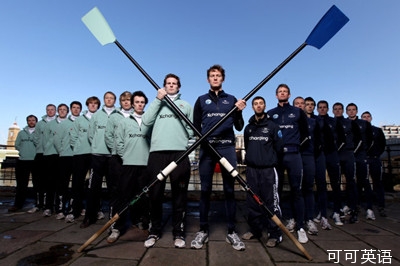Still in Books and Arts; Book Review; The Oxford-Cambridge boat race; Shock and oar;
Blood Over Water: Oxford Versus Cambridge. One Race. Two Brothers. Only One Winner. By David and James Livingston;

Sibling rivalry has many famous examples. Cain and Abel, Linus and Lucy, Liam and Noel. Less well-known, but no less competitive, are David and James Livingston, two brothers who, in April 2003, raced on opposite sides in the Oxford and Cambridge University Boat Race, one of the toughest sporting challenges in the world.
同室操戈有很多典故。該隱和亞伯,萊納斯和露西,里昂和諾埃爾。名氣小點的,競爭卻一點也不小的,是利維斯頓家的大衛和詹姆斯。2003年4月這兩兄弟在牛津和劍橋大學劃艇賽中正好各為其主。這項賽事激烈艱苦,世上已屬罕見。
“Blood Over Water”, published to coincide with the 155th boat race on March 29th, tells in alternating narratives the story of how the brothers' quest for victory turned them into enemies. Providing context is the broader tale of the historic rowing competition between two prestigious universities.
《水上血戰》3月29日出版,恰逢第155屆劃艇賽。該書交替講述兩兄弟如何爭相奪冠乃至反目成仇。故事背景是兩大名校載入史冊的劃艇賽。
The first boat race took place in 1829 on the River Thames at Henley in Oxfordshire and was the culmination of an idea of Charles Merivale, a Cambridge student, and his Harrow schoolmate Charles Wordsworth (nephew of poet William), at Oxford. The event was such a success—newspapers of the day reported crowds of 20,000—that Henley decided to organise its own (now famous) regatta and the boat race moved to Westminster in London. By 1845, with Westminster too crowded, the race moved up river to Putney. Today it still runs four-and-a-quarter miles (6.8km) from Putney to Mortlake and, despite being in the public eye for just one day each year, attracts a global audience of around 120m.
1829年第一次劃艇賽在牛津郡亨里鎮的泰晤士河上舉行。此事源自劍橋學生查爾斯·梅里瓦勒和他以前哈羅公學的同學,牛津學生查爾斯·沃茲沃斯(詩人威廉·沃茲沃斯的侄子)的突發奇想。這項賽事竟大獲成功,據當天報紙報道,有多達兩萬人圍觀,以至亨里鎮決定組織自家的劃艇賽(如今已享盛名),而原來的劃艇賽移至倫敦的西敏寺。到了1845年,因西敏寺人滿為患,賽事又轉至上游的普特利。今日賽程依舊4.25英里(6.8公里),從普特利劃至莫特雷克,雖然比賽一年僅有一天,但仍在全球吸引了一億兩千萬上下的觀眾。
Training is brutal. For seven months potential crews (each with eight oarsmen and a cox) undergo two intense sessions every day, one on the water and one on indoor rowing machines or ergometers. Over that time they put in two hours' work for each of the 600 strokes they will take in the race. As they train, hearts race at over 200 beats a minute; lactic acid builds to stinging levels in muscles; fragile capillaries burst in the lungs. To combat the physical demands made on them oarsmen must consume 6,000 calories a day, more than twice the normal daily requirement for men. All of this must be balanced against the demands of tutors, supervisions, essays, exams and long-suffering girlfriends.
賽事訓練慘無人道。預備隊員(每隊八位劃槳手一位舵手)每天承受兩次高強度訓練達七月之久,一次在水上,另一次在室內劃艇設備或測功機上。期間隊員花兩個小時腿蹬臂拉,做滿全程比賽的六百次劃槳動作。訓練中心臟每分鐘跳兩百多次;乳酸暴增教肌肉如遭芒刺;脆弱的毛刺血管在肺部炸裂。為達到體能要求劃槳手每日需消耗六千卡路里,高出正常水平一倍有余。還得在導師、督導、論文、考試和長年受苦的女友間折沖樽俎,權衡輕重。
“Blood Over Water” stands out from the mass of sporting memoirs thanks to the authors' open portrayal of their relationship as the build-up to the race intensifies. David, the younger by three years, speaks unashamedly of his struggle to keep up with the high-achieving James, his emotions swinging from pride and love to envy and hate. James dreads failure and is consumed by the fear that his kid brother might beat him at his chosen endeavour. As race day approaches the two opposing camps eat meals at opposite ends of the family kitchen, communication is reduced to curt nods, and the feeling of brotherhood is replaced by one of hostility.
《水上血戰》從眾多體育回憶錄中脫穎而出,歸功于兩位作者坦然描述自準備階段到賽事白熱化的兄弟情誼。小三歲的大衛毫無顧忌地述說趕上高水平詹姆斯的奮斗史,情感或愛慕有加,或嫉恨如狂。詹姆斯極懼失敗,生怕被弟弟在他為之奮斗的事業上擊敗,這念頭搞得他心力憔悴。賽事臨近,兩兄弟在家里廚房相對而坐一起吃飯,閑聊不再,日漸寡言,手足之情讓位給敵我戒備。
The irony of it all is that when Oxford wins the race, by one foot—a 0.0043% difference over the length of the course and the smallest margin on record—the younger man's joy is tinged with guilt at taking away his brother's dream. Proof indeed, that blood is thicker than water.
可笑最后牛津獲勝時,差距僅為一英尺,即比賽全程的0.0043%,立馬創了記錄。弟弟欣喜之余,不免內疚橫刀奪走兄長夢想。畢竟,血濃于水。











